Acclimation of photosynthetic organisms to solar and extrasolar radiation
Cell and Plant Physiology Laboratory of CEA Grenoble
Advisors: Dimitris Petroutsos and Olivier Bastien
SUBJECT DESCRITION:
In Grenoble, several world-leading teams working in the field of origin of life gathered around the crossdisciplinary project COOL (Cross-disciplinary approach on the Origin Of Life), bringing together the expertise of biology, planetology, astrophysics, geology, prebiotic chemistry and paleontology. One of the goal of this project is the improvement of the life detection outside the Solar System, especially in habitable zone of M-dwarfs for which the characterization of their atmosphere will be amenable in the coming decade.
In photosynthetic organisms, solar light collected by pigments present in the light-harvesting complexes, such as chlorophylls and carotenoids, is transferred to the reaction centers of photosystems, triggering electron flow, leading to ATP and NADPH generation for use in CO2-fixation. Mostly blue and red light are collected by the lightharvesting complexes to fuel photosynthesis, but plants and algae also express photoreceptor proteins collectively sensitive to almost every light wavelength. These photoreceptors convert light, sensed by chromophore molecules, into biological signals controlling gene expression, photo-orientation, developmental processes, entrainment of the
circadian clock, and many other processes. Therefore, the light quality is important not only for the energy requirements of photosynthesis but also for the cellular homeostasis of photosynthetic organisms controlled by the photoreceptors.
How are photoperception and photosynthesis mechanistically interconnected? And how would photosynthetic organisms adapt to a stellar radiation with a spectral energy distribution different than this of earth?
To address these questions, we will study the acclimation of the model photosynthetic organism Chlamydomonas reinhardtii, ancestor of higher plants, to stellar radiation of low and high intensities. We will assess the consequences of the exposure to this peculiar radiation at the level of genome-wide gene expression, photosynthetic activity, growth and cellular ultrastructure, using white visible light, blue and red illumination as reference conditions. Based on our results we are expecting to identify genes or gene-networks that are essential for the successful acclimation to the radiation of different light qualities. Using genome editing tools we will modify genes of interest to potentially
generate mutants that will be adapted to type M radiation. The illumination with different light qualities will be achieved by use of LED panels. The expertise of IPAG will be valuable for the construction of a LED- panel mimicking the spectrum to type M radiation.
This thesis project is part of a comprehensive cross disciplinary project focused on the ‘Common Origin of Life’ (COoL) supported by the Grenoble-Alpes IDEX (ANR-15-IDEX-02) bringing together astrophysicists, chemists, biologists and humanists. The work will be co-supervised by Dr. Dimitris Petroutsos and Dr. Olivier Bastien, both working at the Cell and Plant Physiology Laboratory of CEA Grenoble.
Candidate profile: The candidate should have a Master2 or equivalent in biology with a knowledge in molecular biology, microbiology and/or plant biology. The project should start by October 1st 2018.
ELIGIBILITY CRITERIA:
Applicants:
– must hold a Master’s degree (or be about to earn one) or have a university degree equivalent to a European Master’s (5-year duration),
Applicants will have to send an application letter in English and attach:
– Their last diploma
– Their detailed CV
– Their grades obtained during Master 1 and Master 2
– A letter of motivation (2 to 3 pages max)
– Letters of recommendation are welcome.
Address to send their application: Dimitris.petroutsos@cea.fr and Olivier.bastien@cea.fr
SELECTION PROCESS:
Application deadline: 01 June 2018 at 17:00 (CET)
Applications will be evaluated through a three-step process:
1. 1st round of selection: the applications will be evaluated by a Review Board in the week of 11 June 2018. Results will be given the 15 June 2018.
2. If necessary a 2nd round of selection will be organized: shortlisted candidates will be invited for an interview session in Grenoble or by skype during the week of 18 June 2018. (if necessary)
3. Eligibility check by doctoral school early July
4. Beginning of the PhD : October or November 2018
CONTRACT:
TYPE: temporary-3 years of doctoral contract
JOB STATUS: Full time
HOURS PER WEEK: 35
Salary: between 1768.55 € and 2100 € brut per month (depending on complementary activity or not)
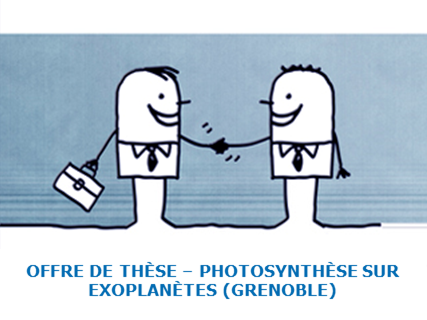

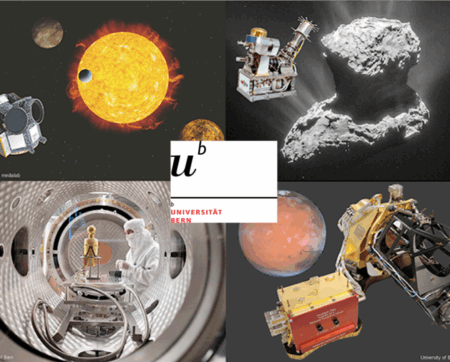
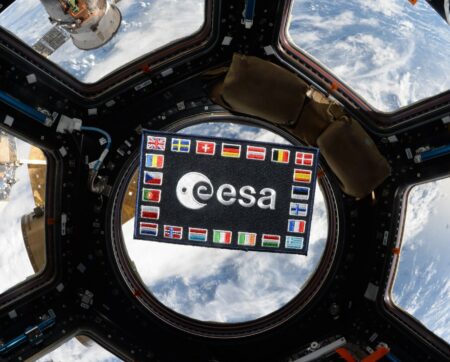
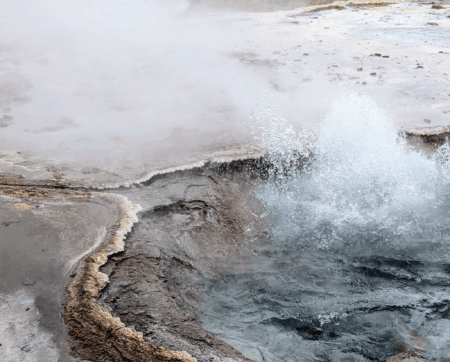
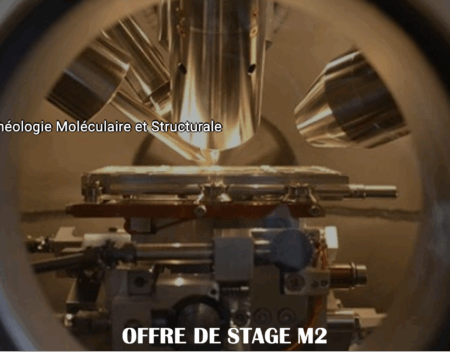
Aucun commentaire sur l'article Offre de thèse à Grenoble photosynthèse sur exoplanètes